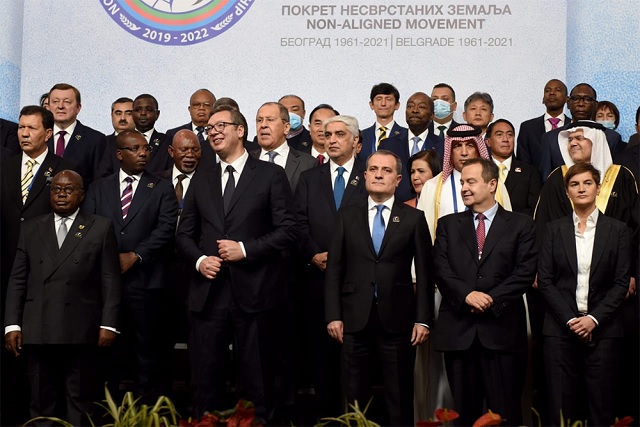
No funding for NAM and G77 gatherings- parliament report
Kampala, Uganda | IAN KATUSIIME | Two major international summits that were meant to happen in Kampala in the next one year will not happen after government failed to allocate them funding. The summits are the Non Aligned Movement (NAM) and the G77; the latter summit has been in the works since covid19 broke out. The combined cost of the events is Shs50billion- Shs30 billion for NAM and Shs20billion for G77.
This revelation of the funding shortfalls was contained in a report by the parliamentary committee on Foreign Affairs on the ministerial policy statement and budget estimates for the ministry of foreign affairs for the Financial Year 2022/2023. The two highly billed diplomatic events were listed in a section of the parliamentary report titled “Critical unfunded priorities for FY 2022/2023”.
The report was adopted by parliament on April 19 and also shed light on other persistent issues that have dogged Uganda’s foreign missions for years.
For their huge profiles, the NAM and G77 summits have been touted by Uganda to boost its image in the international community after a series of bad press for the Ugandan government occasioned by torture and illegal arrests and detention of members of the political opposition. The firefighting for Uganda’s image in the international community has been compounded by an array of sanctions targeting Uganda’s high ranking political and military figures.
In February, Uganda’s Permanent Representative to the U.N., Adonia Ayebare, said that Uganda abstained from the vote to condemn Russia’s invasion of Ukraine in a UN General Assembly emergency session because as incoming chair of NAM, “neutrality is key”.
The NAM is a forum of 120 countries that are not formally aligned with or against any major power bloc. It was formed in 1961 as most countries in Africa attained independence and the Cold War took shape pitting the US against the Soviet Union. After the United Nations, the NAM is the largest grouping of states worldwide.
Uganda was endorsed for the chairmanship of NAM as early as 2019 and it will be the chair from 2022- 2025. Azerbaijan has been chairing the body since 2019 and its term runs out this year.
The G77 summit was scheduled to take place in Kampala in April 2020 but just a few months earlier, the world was going into lockdowns as Covid19 spread across the world. The G77 formally known as The Group of 77 is the largest intergovernmental organisation of developing countries in the United Nations, which provides the means for countries of the Global South to articulate and promote their collective economic interests and enhance their joint negotiating capacity on all major international economic issues within the United Nations system, and promote South-South cooperation for development.
The South Summit, the supreme-decision making body of the G77 was first held in Havana, Cuba in 2000, the second one was held in Doha, Qatar in 2005 and the Kampala summit was to be the third South Summit.
The G-77 was established on June 15, 1964 by 77 developing countries that were signatories of the “Joint Declaration of the Seventy-Seven Developing Countries” issued at the end of the first session of the United Nations Conference on Trade and Development (UNCTAD) in Geneva, Switzerland.
Henry Okello Oryem, the minister of state for foreign affairs, could not be reached for comment on the fate of the two summits that fall under the foreign affairs ministry.
‘Deplorable state of properties’
The parliamentary committee in its report decried the state of Uganda’s missions abroad. Some of the deplorable properties were condemned by the host countries according to the report. “The Permanent Mission in Ottawa, Canada for instance vacated the chancery and the residence in 2013 because the chancery was sinking and it was in a deplorable state; while the residence had run down.”
It noted that the operations of the missions were affected because the staff were renting elsewhere. The report stated other missions were yet to be allocated funding for construction and renovation. It noted that critical missions in London, Washington, Copenhagen, Pretoria, Dar-es-Salaam and Nairobi were in dire need of renovation.
The committee in its report said there was a high cost of renting old properties for Uganda’s missions such as Shs1.8bn in Berlin (Germany) and Shs1.6bn in Riyadh (Saudi Arabia). 80% of the missions were not allocated capital development funds which hindered their ability to carry out some of the much needed renovations and other critical operations.
Findings of the report also stated that there were not enough locally recruited staff to handle the burgeoning workload in some missions. The Berlin and Geneva missions were singled out because they handle several multi-lateral international organisations. The Geneva mission is lowly staffed yet it is accredited to cover 33 international organisations of which 23 are intergovernmental and 8 are UN agencies.
For Middle East missions, staff were overwhelmed by the ever increasing number of distressed migrant workers. “In Riyadh for instance, it was indicated that there is need for more Sharia female trained staff,” the report noted.
Daily Monitor reported that an average of 24,000 Ugandans flock to the Middle East for jobs every year as per a report from the Ministry of Gender and Labour. The biggest numbers travel to Saudi Arabia and United Arab Emirates (UAE) and Qatar.
****
 The Independent Uganda: You get the Truth we Pay the Price
The Independent Uganda: You get the Truth we Pay the Price






Uganda can host major summits but the challenge is organisation. That is to say,although Uganda has many hotels and lodges there remains a problem of poor roads. The roads which were constructed for CHOGM(Common Wealth Heads Of Government Meeting) which Uganda hosted,are now in poor state. The roads which were constructed were sub-standard.